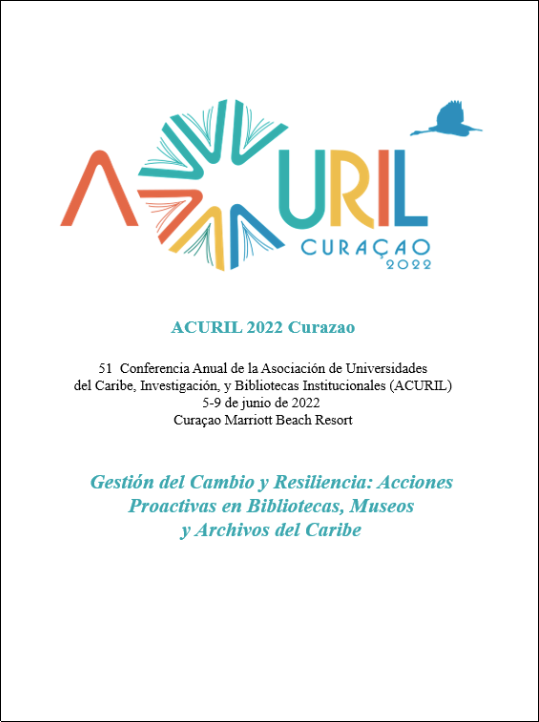Abstract
In recent years, memory institutions have been extremely challenged by the effects of the global climate change and man-made disasters on their documentary heritage. We have seen and experienced firsthand how hurricanes, floods, earthquakes, fire, bombings wreaked havoc on archives, museums and libraries. The hurricanes in 2017 that affected cultural properties across the Northern Caribbean region was an urgent wakeup call for memory institutions such as the Caribbean Branch of the International Council on Archives (CARBICA) to respond to the challenges of climate change mitigation and adaptation. They recognized that improved impact of climate change threats could best be achieved through liaison with other emergency response groups and memory institutions and professionals in the region rather than through isolated activities since memory institution share limited resources. For example, a regional approach for the protection of documentary heritage is imperative especially since small island developing states are so scattered and stretched.
To this end, CARBICA has taken the initiative to establish a Caribbean Heritage Emergency Network (CHEN) that was launched in 2019 to facilitate regional and international responses to emergencies threatening cultural property and to encourage the preservation of documentary heritage especially by promoting risk preparedness, recovery, response and mitigation measures. CHEN objectives are to facilitate regional and international responses to emergencies threatening cultural property, encourage safeguarding and respect for cultural property especially by promoting risk preparedness, recovery, response and mitigation measures, train experts at national and regional level to prevent, respond and recover from disasters, act in an advisory capacity for the protection of endangered heritage, consult and co-operate with other bodies including UNESCO, ICCROM, ICOM (International Council of Museums), CDEMA, Smithsonian Cultural Rescue Initiative, Prince Claus Fund Cultural Emergency Response Program and the International Council on Archives.
CARBICA CHEN since then has been initiating alliances with the UNESCO Cluster Office in Kingston, the ICCROM, ICA, the Prince Claus Fund and Gerda Henkel Stiftung to raise awareness on heritage preservation, deliver trainings and conduct damage need assessments in the region. To make CHEN more visible for the public, special features were added to the new CARBICA website where you can view or read more about the organization structure of CHEN and view the list of CHEN experts.
By doing this, heritage professionals will be able to reach out and have easy access to CHEN experts whenever they are in need of support or advise. A communication strategy has been developed by to ensure that we reach our objectives towards our members as much as possible. For regional memory institutions it is imperative to join the CHEN network to ensure that they have this support system to go to for advise, capacity building activities on the preservation of cultural heritage in general and a disaster risk reduction and building back after a disaster. In our vision, CARBICA CHEN should operate as a regional Caribbean hub for safeguarding cultural heritage. CHEN’s experts will provide training in Preparedness, Response, Recovery and Mitigation in the Caribbean region.hub
In this context CHEN’s objectives for 2022- 2023 is to install a mobile conservation laboratory for the region. Most of the Caribbean island does not have a conservation unit or conservators to salvage and stabilize their cultural heritage after a disaster. After the occurrence of a disaster the mobile lab can be deployed to the affected areas accompanied by regional conservators to salvage the cultural heritage. By doing this the islands don’t have to wait months for assistance from Europe or USA to rescue their cultural heritage. The mobile lab will be within reach in the region as well as trained conservators to assess the damage and stabilize the heritage within weeks. The mobile lab will not only be put into use post-disaster, but will be used for training regional professionals the entire year.
Another priority for CHEN is to liaise with national and regional disaster management agencies as well as national governments to promote, discuss and implement policy actions for the preservation of documentary heritage and disaster risk reduction. A recent example of this was the recent project that was conducted by the National Archives Suriname to initiate a project to develop emergency preparedness and disaster management plans for heritage institutions in Suriname. The National Archives Suriname reached out to the local government (Directorate of Culture), the National Commission of UNESCO and the National Coordination center for Disaster Management in Suriname to endorsed this project which was funded by the Prince Claus Fund| Cultural Emergency Response. Seventeen memory institutions (private and public) are now developing their emergency preparedness plan under the supervision of the National Coordination center for Disaster Management in Suriname. The ultimate goal is to have a comprehensive national plan for disaster management for memory institution added on the national disaster management plan for Suriname. On Curacao similar initiatives have been done by the National Committee of Blue Shield Curacao.
To conclude, from the examples above CARBICA CHEN recognized and experienced that joining forces on national and regional level with relevant stakeholders to mitigate the challenges imposed by the effects of extreme weather events at this stage have the most effective outcome for memory institutions. National and/or regional Memory of the World committee's can be at the forefront of advocating and implementing regional hub for instance in the Middle East, Africa and the Pacific region.

This work is licensed under a Creative Commons Attribution-NonCommercial-NoDerivatives 4.0 International License.
Copyright (c) 2022 Tjien Fooh Rita, Maximiliaan Scriwanek

